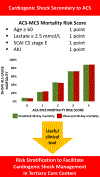Predicting mortality in cardiogenic shock secondary to ACS requiring short-term mechanical circulatory support: The ACS-MCS score
- PMID: 33682308
- PMCID: PMC8421447
- DOI: 10.1002/ccd.29581
Predicting mortality in cardiogenic shock secondary to ACS requiring short-term mechanical circulatory support: The ACS-MCS score
Abstract
Objective: To identify predictors of 30-day all-cause mortality for patients with cardiogenic shock secondary to acute coronary syndrome (ACS-CS) who require short-term mechanical circulatory support (ST-MCS).
Background: ACS-CS mortality is high. ST-MCS is an attractive treatment option for hemodynamic support and stabilization of deteriorating patients. Mortality prediction modeling for ACS-CS patients requiring ST-MCS has not been well-defined.
Methods: The Utah Cardiac Recovery (UCAR) Shock database was used to identify patients admitted with ACS-CS requiring ST-MCS devices between May 2008 and August 2018. Pre-ST-MCS clinical, laboratory, echocardiographic, and angiographic data were collected. The primary endpoint was 30-day all-cause mortality. A weighted score comprising of pre-ST-MCS variables independently associated with 30-day all-cause mortality was derived and internally validated.
Results: A total of 159 patients (mean age, 61 years; 78% male) were included. Thirty-day all-cause mortality was 49%. Multivariable analysis resulted in four independent predictors of 30-day all-cause mortality: age, lactate, SCAI CS classification, and acute kidney injury. The model had good calibration and discrimination (area under the receiver operating characteristics curve 0.80). A predictive score (ranging 0-4) comprised of age ≥ 60 years, pre-ST-MCS lactate ≥2.5 mmol/L, AKI at time of ST-MCS implementation, and SCAI CS stage E effectively risk stratified our patient population.
Conclusion: The ACS-MCS score is a simple and practical predictive score to risk-stratify CS secondary to ACS patients based on their mortality risk. Effective mortality risk assessment for ACS-CS patients could have implications on patient selection for available therapeutic strategy options.
Keywords: acute coronary syndrome; cardiogenic shock; mechanical circulatory support.
© 2021 Wiley Periodicals LLC.
Figures




Comment in
-
Risk prediction in cardiogenic shock.Catheter Cardiovasc Interv. 2021 Dec 1;98(7):1285-1286. doi: 10.1002/ccd.29996. Catheter Cardiovasc Interv. 2021. PMID: 34851024 No abstract available.
Similar articles
-
Trends in mechanical circulatory support use and hospital mortality among patients with acute myocardial infarction and non-infarction related cardiogenic shock in the United States.Clin Res Cardiol. 2018 Apr;107(4):287-303. doi: 10.1007/s00392-017-1182-2. Epub 2017 Nov 13. Clin Res Cardiol. 2018. PMID: 29134345
-
Early Escalation of Mechanical Circulatory Support Stabilizes and Potentially Rescues Patients in Refractory Cardiogenic Shock.Circ Heart Fail. 2020 Mar;13(3):e005853. doi: 10.1161/CIRCHEARTFAILURE.118.005853. Epub 2020 Mar 13. Circ Heart Fail. 2020. PMID: 32164431
-
Association of systemic inflammation with shock severity, 30-day mortality, and therapy response in patients with cardiogenic shock.Clin Res Cardiol. 2024 Feb;113(2):324-335. doi: 10.1007/s00392-023-02336-8. Epub 2023 Nov 20. Clin Res Cardiol. 2024. PMID: 37982862 Free PMC article.
-
Review of Pathophysiology of Cardiogenic Shock and Escalation of Mechanical Circulatory Support Devices.Curr Cardiol Rep. 2023 Apr;25(4):213-227. doi: 10.1007/s11886-023-01843-4. Epub 2023 Feb 27. Curr Cardiol Rep. 2023. PMID: 36847990 Review.
-
Current evidence in the diagnosis and management of cardiogenic shock complicating acute coronary syndrome.Rev Cardiovasc Med. 2021 Sep 24;22(3):691-715. doi: 10.31083/j.rcm2203078. Rev Cardiovasc Med. 2021. PMID: 34565070 Review.
Cited by
-
Advances in the Staging and Phenotyping of Cardiogenic Shock: Part 1 of 2.JACC Adv. 2022 Oct 28;1(4):100120. doi: 10.1016/j.jacadv.2022.100120. eCollection 2022 Oct. JACC Adv. 2022. PMID: 38939719 Free PMC article. Review.
-
A prognostic nomogram for long-term major adverse cardiovascular events in patients with acute coronary syndrome after percutaneous coronary intervention.BMC Cardiovasc Disord. 2021 May 22;21(1):253. doi: 10.1186/s12872-021-02051-0. BMC Cardiovasc Disord. 2021. PMID: 34022791 Free PMC article.
-
Evaluation of the Aspartate Aminotransferase to Platelet Ratio Index for Predicting In-Hospital Mortality in Cardiogenic Shock Patients Admitted to the Intensive Care Unit.Rev Cardiovasc Med. 2025 Apr 16;26(4):26590. doi: 10.31083/RCM26590. eCollection 2025 Apr. Rev Cardiovasc Med. 2025. PMID: 40351674 Free PMC article.
-
Informing Management of Patients Developing Cardiogenic Shock at a Spoke and Being Transferred to a Hub.J Am Heart Assoc. 2025 Feb 18;14(4):e035464. doi: 10.1161/JAHA.124.035464. Epub 2025 Feb 14. J Am Heart Assoc. 2025. PMID: 39950322 Free PMC article.
-
PRospective REgistry of PAtients in REfractory cardiogenic shock-The PREPARE CardShock registry.Catheter Cardiovasc Interv. 2022 Sep;100(3):319-327. doi: 10.1002/ccd.30327. Epub 2022 Jul 13. Catheter Cardiovasc Interv. 2022. PMID: 35830719 Free PMC article.
References
-
- Hollenberg SM, Kavinsky CJ, Parrillo JE. Cardiogenic shock. Ann Intern Med 1999;131:47–59. - PubMed
-
- Reynolds HR, Hochman JS. Cardiogenic shock: current concepts and improving outcomes. Circulation 2008;117:686–97. - PubMed
-
- Hochman JS, Sleeper LA, Webb JG et al. Early revascularization in acute myocardial infarction complicated by cardiogenic shock. SHOCK Investigators. Should We Emergently Revascularize Occluded Coronaries for Cardiogenic Shock. N Engl J Med 1999;341:625–34. - PubMed
-
- Baran DA, Grines CL, Bailey S et al. SCAI clinical expert consensus statement on the classification of cardiogenic shock: This document was endorsed by the American College of Cardiology (ACC), the American Heart Association (AHA), the Society of Critical Care Medicine (SCCM), and the Society of Thoracic Surgeons (STS) in April 2019. Catheter Cardiovasc Interv 2019;94:29–37. - PubMed
Publication types
MeSH terms
Grants and funding
LinkOut - more resources
Full Text Sources
Other Literature Sources

